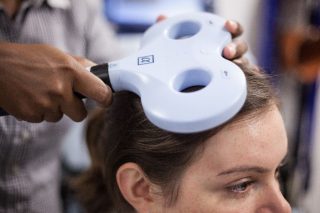Blog: Centre hosts A Level students for placements organised by the Nuffield Trust
Over the Summer, the Centre welcomed two talented A Level students to the ARM lab for a 2 week placement. Each student was matched with a PhD student mentor, who supported them to produce a report including a literature review and data analysis.
The placements were arranged by STEMPOINT East for students who successfully applied to the Nuffield Research Placements programme. Students who come from low income backgrounds, or those who will be the first in their family to go to university are given priority for Nuffield Foundation placements.

Hamida Begum, one of the placement students, shares some highlights from her placement under the supervision of the ARM lab’s Jenny Lee:
I took part in Nuffield’s work placement where I worked alongside a neuroscientist to answer the question: how are brain excitability measures affected by Transcranial magnetic stimulation (TMS) coil movement?
I wrote a detailed report and created a poster which explained how the MEP size will vary depending on the accuracy of the person directing the TMS pulse to a patient’s brain and provide knowledge on factors combined with one another which can change the amount of excitability in a certain muscle by using regressions.
I am thankful to Jenny Lee for her amazing support in collating references and data and being a part of the Nuffield’s community which has helped me gain a new sophisticated writing technique and an improved work ethic. Moreover an analytic approach with rigour to meet the demands of work and challenges that may come about when working in the medical field. What I particularly found interesting was how the amplitude of the MEP can vary depending on where the TMS pulse is directed on the scalp as different neurons will be targeted by the stimulation, so different muscles may be excited instead of the desired one so the MEP for the particular muscle will be lower or higher.
I understood how neuroscientists, during a procedure with a patient, must develop a rapport with the patient and understand how they feel and what their needs are. I implemented these skills in my role as a student leader for my school where I understood how being empathetic but also being impartial is essential to assess the needs of the students effectively and advocate for them without words being lost in translation.